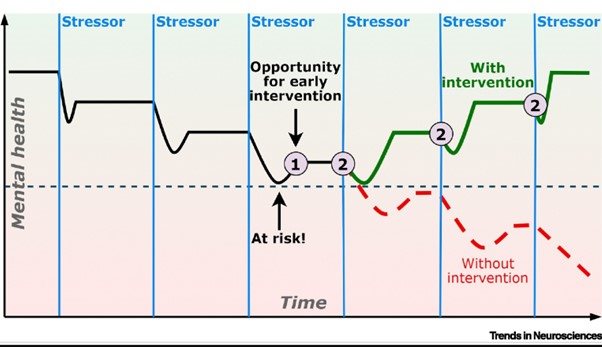
Stress-related disorders are among the biggest global health challenges that requires innovative solutions. In recent research, Florian Krause, David Linden and Erno Hermans, propose contemporary neurofeedback as a promising method to address these disorders, offering hope for millions around the world.
Stress-related disorders have emerged as a critical global health concern rapidly. Many people do not find relief from traditional treatments like therapy and medication. The COVID-19 pandemic and other global crises have only intensified these issues. This growing societal problem requires urgent action and more effective interventions.
Neuroscientific studies have shown that stress-related disorders are linked to dysfunctional changes in the brain’s large-scale networks. These networks, which involve multiple regions of the brain, react to stress in ways that are maladaptive, meaning they do not respond properly. The research of Krause suggests that these networks could be directly targeted and modified to help manage stress-related disorders more effectively.
Neurofeedback
Neurofeedback is a method that helps people to learn to control their brain activity. It gives them real-time information about their brain function, allowing them to adjust it and achieve healthier brain patterns. Once people learn how to do this, they can use these skills to manage stress on their own, even outside of therapy sessions.
A personalised approach to stress management
What makes neurofeedback especially promising is its potential for personalised interventions. This method allows for tailored training, enabling individuals to learn how to modulate their brain activity in response to real-life stressors. This approach could help to prevent prolonged and repeated exposure to stress from escalating into disorders, providing a preventive measure rather than just a treatment option.

By training individuals at risk of developing stress-related symptoms to apply these skills at crucial moments (i.e. in response to real-life stressors), neurofeedback could be integrated into everyday scenarios, helping people manage stress before it becomes overwhelming. Such just-in-time adaptive interventions represent a forward-thinking solution to one of the world’s most pressing mental health challenges.
With more research and clinical trials underway, Krause is optimistic about the potential of neurofeedback. It stands out as a candidate for personalised, preventive interventions that could improve how we treat and manage stress-related disorders.
-
Paper in Trends in Neurosciences: Getting stress-related disorders under control: the untapped potential of neurofeedback - Florian Krause, David E.J. Linden, Erno J. Hermans
-
Want to know more about these subjects? Click on the buttons below for more news.
More information
Pieter Lomans

persvoorlichter






